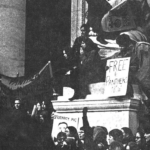
Yale News
On Tuesday, the Yale Political Union hosted a debate in which participants discussed the consequences and rewards of patriotism and whether it should be promoted in the United States.
The debate, “Resolved: Reclaim Patriotism,” was influenced by professor of political science Steven Smith’s new book, “Reclaiming Patriotism in an Age of Extremes.” Smith, one of the participants, gave the first speech, arguing for the promotion of patriotism. After Smith’s initial speech, students were then invited to argue for the negative and affirmative as the night went on.
“Patriotism and love of country is a form of loyalty,” Smith said during the debate. “Loyalty is a much underappreciated virtue, but we live our lives in webs of loyalty. … Loyalty defines our commitments, who we are what we care about.”
In his speech, Smith focused on the connection between patriotism and virtues such as loyalty, pride and gratitude. In addition, he argued for the importance of reclaiming patriotism from cosmopolitanism and nationalism.
According to Smith, the educated elite class has an obscure relationship to patriotism. He observed that while the elite are the ones most benefiting from their country, they are often the ones that resent it the most.
Cosmopolitanism, or the idea of being “citizens of the world,” is an ideology expressed by many educated elite, and is often used as a way to resist ideas of patriotism, Smith said.
“In many ways, the least patriotic people are not the ones from minority communities or who have had some kind of injustice and oppression, but precisely from the American elites,” Smith said. “Those who have had all the advantages and extra advantages that societies can confer on them. They are the ones often that seem the most resentful, critical and unpatriotic.”
Smith stated that students would not have to look far to find reminders of American patriotism. In fact, symbols of patriotism are integrated into the architecture and landscape of the University. He referenced the etchings inside Woolsey Hall that list the names of Yale students who have given their lives in all wars.
To support the reclamation of patriotism, Smith likened the love of one’s country to the love of one’s family. For example, Smith noted that love within families exists despite imperfections and flaws.
Student speeches in the negative offered alternative perspectives.
Brandon Chambers ’21 gave the first speech in the negative. He discussed the role of immigrants when discussing patriotism, and its importance in American identity. He stressed that one should focus on the individuals around them rather than ideals of the country itself.
“At best we are left with a kind of patriotism that says, ‘we are all part of this community, let’s figure out how to live together,’” Chambers said. “And I think it is at this point that the question becomes much less about what is American, but rather how do we treat one another as human beings.”
This outlook on patriotism is less about country and more about people, according to Chambers.
YPU Vice President Mathis Bitton ’23, who is also a staff columnist at the News, explained the reasoning behind the topic of this debate. In recent years, patriotism’s real meaning has been distorted due to certain leaders and movements who have used love of country to exclude and marginalize minority groups, according to Bitton.
“This debate is a way for us to ask whether patriotism itself can be distinguished from the demagogues who weaponize it,” Bitton wrote in an email.
Smith described the reactions he received from his colleagues when he explained the argument of his novel. According to Smith, admitting that you support patriotism is viewed as synonymous with being an “axe murderer in certain circles.”
Patriotism’s negative connotations are one of the reasons why Smith thinks the conversation is so important.
“I wanted Yale students to hear someone on the faculty make the case for patriotism, to show why love of country can be an ennobling sentiment,” Smith wrote in an email to the News.
Even still, Bitton mentioned all the good things that can come from patriotism, calling it a “uniting force, a vector of solidarity and a source of communal attachment.” Bitton said the debate is “central to America’s future” and one that Yalies have to think about.
The resolution ended as 18-17-0, with reclaiming patriotism in the affirmative winning the debate.
The Yale Political Union was founded in 1934.
Alex Ori | alex.ori@yale.edu
Correction, Mar. 4: An earlier version of this story only mentioned that the names of Yalies who died fighting in World War I are inscribed in Woolsey Hall. In fact, the names of Yalies who served and died in all wars are inscribed in Woolsey. The story has been updated.








